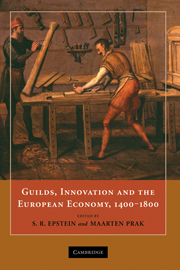Book contents
- Frontmatter
- Contents
- List of Contributors
- Acknowledgments
- Introduction: Guilds, Innovation, and the European Economy, 1400–1800
- 1 Craft Guilds, the Theory of the Firm, and Early Modern Proto-industry
- 2 Craft Guilds, Apprenticeship, and Technological Change in Pre-industrial Europe
- 3 Subcontracting in Guild-based Export Trades, Thirteenth–Eighteenth Centuries
- 4 Circulation of Skilled Labour in Late Medieval and Early Modern Central Europe
- 5 Painters, Guilds, and the Art Market during the Dutch Golden Age
- 6 Craft Guilds and Technological Change: The Engine Loom in the European Silk Ribbon Industry in the Seventeenth and Eighteenth Centuries
- 7 Guilds, Technology, and Economic Change in Early Modern Venice
- 8 Inventing in a World of Guilds: Silk Fabrics in Eighteenth-century Lyon
- 9 ‘Not to Hurt of Trade’: Guilds and Innovation in Horology and Precision Instrument Making
- 10 Reaching beyond the City Wall: London Guilds and National Regulation, 1500–1700
- 11 Guilds in Decline? London Livery Companies and the Rise of a Liberal Economy, 1600–1800
- Index
3 - Subcontracting in Guild-based Export Trades, Thirteenth–Eighteenth Centuries
Published online by Cambridge University Press: 24 June 2009
- Frontmatter
- Contents
- List of Contributors
- Acknowledgments
- Introduction: Guilds, Innovation, and the European Economy, 1400–1800
- 1 Craft Guilds, the Theory of the Firm, and Early Modern Proto-industry
- 2 Craft Guilds, Apprenticeship, and Technological Change in Pre-industrial Europe
- 3 Subcontracting in Guild-based Export Trades, Thirteenth–Eighteenth Centuries
- 4 Circulation of Skilled Labour in Late Medieval and Early Modern Central Europe
- 5 Painters, Guilds, and the Art Market during the Dutch Golden Age
- 6 Craft Guilds and Technological Change: The Engine Loom in the European Silk Ribbon Industry in the Seventeenth and Eighteenth Centuries
- 7 Guilds, Technology, and Economic Change in Early Modern Venice
- 8 Inventing in a World of Guilds: Silk Fabrics in Eighteenth-century Lyon
- 9 ‘Not to Hurt of Trade’: Guilds and Innovation in Horology and Precision Instrument Making
- 10 Reaching beyond the City Wall: London Guilds and National Regulation, 1500–1700
- 11 Guilds in Decline? London Livery Companies and the Rise of a Liberal Economy, 1600–1800
- Index
Summary
The recent literature on craft guilds in late medieval and early modern Europe no longer considers these institutions as obstacles to the rise and expansion of capitalism. Indeed, markets, competition, social inequality, and individualism are now being viewed as characteristics of craft guilds rather than as their antitheses. Ample material is available to substantiate this perception. The enormous flexibility of such institutions, however, does not necessarily mean that the urban craft economy was a freewheeling affair, as some authors are inclined to assume. After all, such a position would suggest that craft guilds had little or no economic impact, which is hardly compatible with their centuries-long existence and with the fact that corporate regulations often instigated criticism on the part of merchants and political elites.
Determining whether and under which conditions urban craft guilds benefited the economy requires an agent-centred perspective. These institutions were set up, transformed, disbanded, re-established, and abolished through interacting groups of agents with different strategies and objectives, amid changing and unequal balances of power. Craft guilds of themselves neither impeded nor promoted economic change and growth; their effects depended on who wielded economic and institutional control, their measure of autonomy with respect to other groups, and their willingness and ability to take the initiative.
- Type
- Chapter
- Information
- Guilds, Innovation and the European Economy, 1400–1800 , pp. 81 - 113Publisher: Cambridge University PressPrint publication year: 2008
- 14
- Cited by



